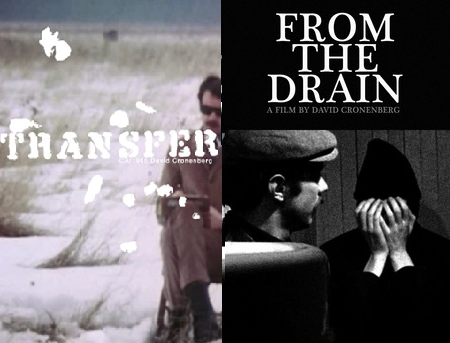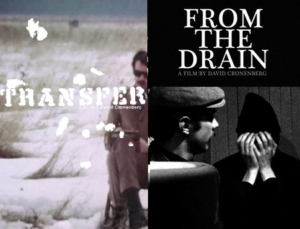
Two short-features, Transfer & From The Drain, are the earliest Cronenberg works filmed and proceed the 1969 feature-length debut, Stereo. As part of a complete review of Cronenberg’s filmography, even these early works showcase a common structure and theme found in subsequent feature films
Transfer (1966)
Directed by: David Cronenberg
Cronenberg’s first short film is a slight prelude for what would follow in feature-length Stereo (1969) & Crimes of the Future (1970). The doctor-patient relationship is glimpsed upon in a snowy, muted location where the patient has sought’ the doctor on the edge of nowhere.
The doctor has both escaped his patients and civilization entirely. Both doctor & patient engage in a strained, unscheduled session where grievances are aired and an interdependent, possibly exploitative relationship between both is explored. By the end, it’s clear that both doctor and patient are playing both roles unconsciously.
The film is slight in both runtime and narrative structure, presenting itself as a sketch of a conversational moment in time. Nonetheless, the short is interesting enough for those viewers who want to see the earliest Cronenberg and the genesis of common tropes presented in subsequent works.

From the Drain (1967)
Directed by David Cronenberg
Cronenberg’s second short film doubles the length of his first 1966 debut Transfer and expands upon the base elements showcased. Visually parsed back compared to the former, this short keeps the surrealistic elements of using place to represent the minds of our character. In this case, swapping the ramshackled wilderness of cognitive and physical flight from Transfer to a bathtub where seemingly a pair of war veterans figuratively and metaphorically circle the drain.
Though not as crisp in direction and message as compared to Transfer, this short draws another straight line to showcase the Cronenberg features to come and common ideas that are found throughout his features. Notably, the first showcase of the characteristic ‘body horror’ found in subsequent works is shown here via the drain.
As is the case with the films to come, even when shown horror directly, the viewer is left to question reality through its unreliable narrators. As one character points out prior to the climax of the short: “Nothing ever comes from the drain, it all comes from the deep end of your mind”.





